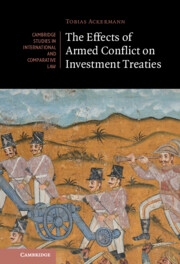Book contents
- The Effects of Armed Conflict on Investment Treaties
- Cambridge Studies in International and Comparative Law: 169
- The Effects of Armed Conflict on Investment Treaties
- Copyright page
- Dedication
- Contents
- Acknowledgements
- Table of Cases
- Table of International Agreements and Documents
- Table of Domestic Instruments and Documents
- Abbreviations
- Introduction
- Part I The Continuity of Investment Treaties
- Part II Investment Protection and the Role of International Humanitarian Law
- Part III Investment Protection Standards during Armed Conflict
- 5 Armed Conflict Clauses
- 6 Full Protection and Security
- 7 Expropriation
- 8 Fair and Equitable Treatment
- Part IV Exceptions and Defences
- Bibliography
- Index
- Cambridge Studies in International and Comparative Law:169
8 - Fair and Equitable Treatment
from Part III - Investment Protection Standards during Armed Conflict
Published online by Cambridge University Press: 11 August 2022
- The Effects of Armed Conflict on Investment Treaties
- Cambridge Studies in International and Comparative Law: 169
- The Effects of Armed Conflict on Investment Treaties
- Copyright page
- Dedication
- Contents
- Acknowledgements
- Table of Cases
- Table of International Agreements and Documents
- Table of Domestic Instruments and Documents
- Abbreviations
- Introduction
- Part I The Continuity of Investment Treaties
- Part II Investment Protection and the Role of International Humanitarian Law
- Part III Investment Protection Standards during Armed Conflict
- 5 Armed Conflict Clauses
- 6 Full Protection and Security
- 7 Expropriation
- 8 Fair and Equitable Treatment
- Part IV Exceptions and Defences
- Bibliography
- Index
- Cambridge Studies in International and Comparative Law:169
Summary
Chapter 8 concludes the analysis of the most important substantive investment treaty clauses by examining the fair and equitable treatment standard. It argues that armed conflict does not put into question certain guarantees of fair decision-making and adjudication, whereas it proposes a balanced relativisation of the protection of investor expectations in the context of armed conflict. The determination of whether treatment is fair and equitable can only be made in the light of the individual circumstances of conflict. When balancing the interests of investors in a stable regulatory framework against the state’s regulatory interests, the urgency and severity of these public interests in armed conflict should be accorded particular weight. Under the proposed reading, the fair and equitable treatment standard is flexible enough to consider the circumstances of an armed conflict in a balanced and nuanced way. Well aware of existing controversies and opposing lines of jurisprudence, the chapter suggests ways to embrace the standard’s flexible nature and counteract tendencies in arbitral practice that arguably overemphasise investor interests.
Keywords
- Type
- Chapter
- Information
- The Effects of Armed Conflict on Investment Treaties , pp. 199 - 214Publisher: Cambridge University PressPrint publication year: 2022

